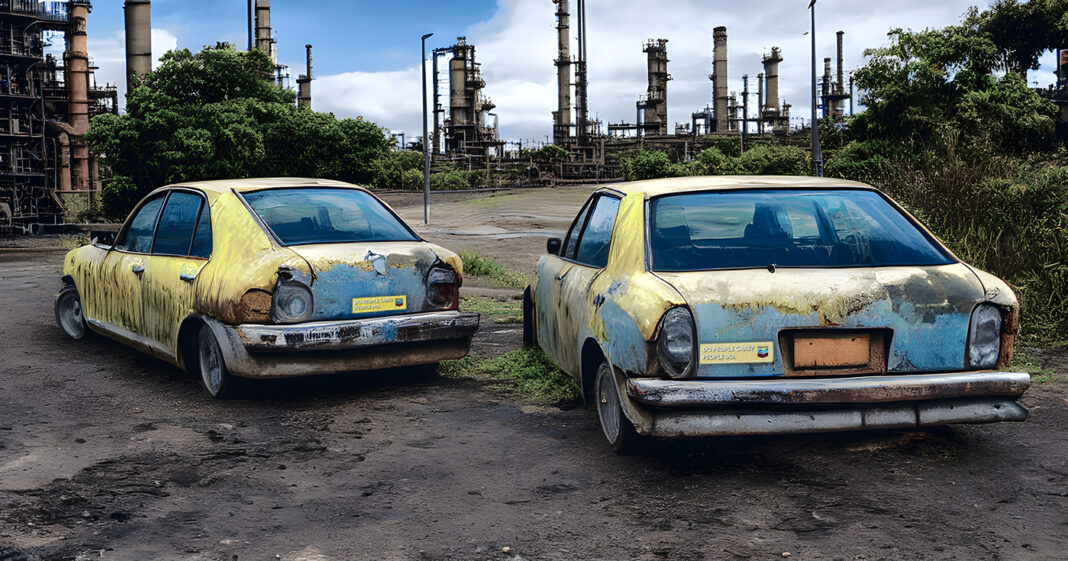San Ramon, CA — In an act of unbridled “altruism and boundless benevolence,” according to the company, the Chevron Corporation has decided to address the decades-long Lago Agrio oil field tragedy with a stroke of pure genius: handing out “Do people care? People do.” bumper stickers to the indigenous people of Ecuador and Colombia. After decades of legal battles, soil contamination, and health crises, the solution has finally arrived as adhesive-backed rectangles.
These stickers, a touching tribute to the corporate world’s commitment to the environment, are expected to single-handedly repair the damage caused by Chevron’s predecessor, Texaco, and soothe the pain of the 30,000 affected inhabitants. It’s the ultimate in corporate responsibility, a masterstroke that has taken the world by storm. Why bother with that pesky $9.5 billion judgment when you can simply hand out a piece of profound propaganda?
Indigenous Reactions to Chevron’s Hollow Gesture
We reached out to the indigenous people of Ecuador and Colombia to gauge their reactions to this groundbreaking development. Juanita, a 54-year-old mother of five, was speechless as she clutched her new bumper sticker.
“I’ve been waiting for years for Chevron to do something, anything, about the pollution that has destroyed our land and our health. And now, they’ve given me a bumper sticker? I don’t even have a car.”
Pedro, a 63-year-old farmer from Colombia, was equally baffled.
“My crops have been dying for years, and my children suffer from respiratory problems due to the toxic fumes in our air. But now, thanks to Chevron’s generosity, I can proudly display this sticker on… what? My tractor? My donkey? It’s a cruel joke.”
A Masterclass in Irony and Corporate Manipulation
In a world where corporations can manipulate courts and public opinion with the ease of a skilled puppet master, Chevron’s latest move is a masterclass in irony. By handing out stickers with a pithy catchphrase, Chevron has managed to simultaneously mock the people they have wronged and mock the concept of corporate accountability.
The sheer brilliance of this maneuver lies in the fact that the bumper stickers are designed to be placed on modes of transportation that rely on the very petroleum products Chevron has been so cavalierly pumping out of the earth. Ah, the delicious taste of irony!
Of course, this is not to diminish the ongoing suffering of the people of Ecuador and Colombia. The decades-long legal battle between the indigenous people and Chevron has left a trail of destruction, despair, and disillusionment. Despite the 2011 Ecuadorian court order and the 2013 confirmation by the Ecuador Supreme Court, Chevron remains defiant, refusing to pay the judgment and claiming the decision was “illegitimate and inapplicable.”
The US courts and The Hague have seemingly bought into Chevron’s version of events, deeming the verdict unenforceable and siding with the corporation. As if to add insult to injury, Chevron has now graciously offered the people of Ecuador and Colombia these magnificent bumper stickers.
The Human Impact and the True Meaning of Chevron’s Gesture
Amid the chaos, it’s important not to lose sight of what truly matters: the people who have been affected by Chevron’s actions. While the indigenous people of Ecuador and Colombia continue to suffer the consequences of the Lago Agrio oil field tragedy, Chevron has skillfully navigated the treacherous waters of international litigation, emerging victorious and unscathed.
So, as the people of Ecuador and Colombia attempt to come to terms with their newfound wealth of bumper stickers, we are left to ponder the true meaning of Chevron’s hollow gesture. Is it a jab at the people they have wronged? A sly wink at the international legal system they have managed to manipulate? Or simply a brazen display of corporate arrogance?
Regardless of the intended message, one thing is clear: Chevron has successfully deflected responsibility, sidestepped justice, and evaded any meaningful reparations. In this farcical game of smoke and mirrors, the ultimate losers are the 30,000 inhabitants of Ecuador and Colombia, who are left with nothing more than a flimsy strip of adhesive-backed irony.
No One Cares
The “Do people care? People do.” bumper sticker campaign is a stark reminder of the absurdity of our times. It is a testament to the power of corporate manipulation, the inadequacy of our legal systems, and the tragic disregard for the lives of the people who bear the brunt of these environmental catastrophes.
In this age of cynicism and satire, the line between tragedy and comedy becomes increasingly blurred. With their twisted irony and heartless mockery, Chevron’s bumper stickers epitomize this cruel blend of farce and despair. While the indigenous people of Ecuador and Colombia continue to suffer, the world watches in disbelief as a powerful corporation wields its influence with impunity, making a mockery of justice and human decency.
So, to the people of Ecuador and Colombia, we say this: hold tight to your bumper stickers. They may not heal your wounds, cleanse your water, or rebuild your lives, but they symbolize a world gone mad, where corporations hold sway, and justice is nothing more than a cruel joke.
And to Chevron, we ask: Do people care? People do. But do corporations care?






